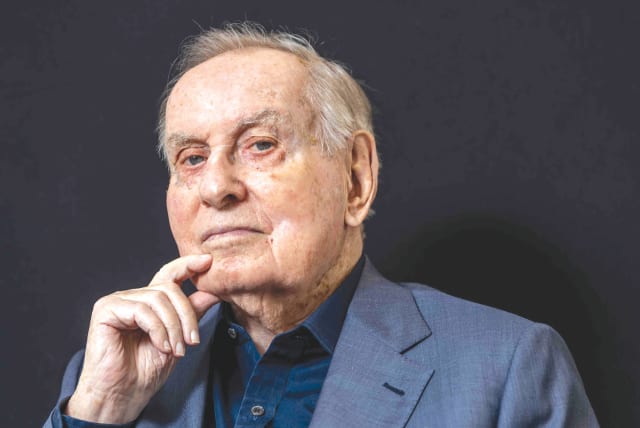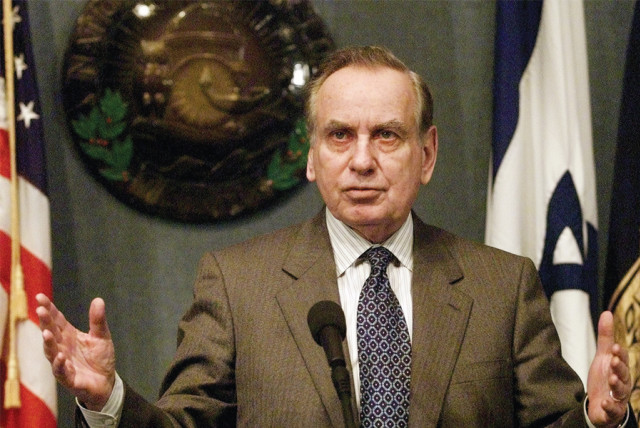Zalman Shoval: A lifetime of insight from Israel's veteran diplomat

He recently released his fourth book, L’da’ati (In My Opinion), a compilation of Hebrew articles and papers on diplomacy and foreign policy issues he has written over this long career.
Few people in this country can say without exaggeration that they have had political contact with every leader here from David Ben-Gurion to Benjamin Netanyahu.
Ninety-three-year-old Zalman Shoval is one of the few.
And when Shoval says that he has had political contact with every national leader, he means every national leader: Ben-Gurion, Moshe Sharett, Levi Eshkol, Golda Meir, Moshe Dayan, Ariel Sharon, Menachem Begin, Yitzhak Shamir, Yitzhak Rabin, Shimon Peres, Ehud Barak, and Netanyahu.
That track record with so many different figures who have shaped the country has come through stints in Military Intelligence, the Foreign Ministry, 14 years in the Knesset as a member of four different political parties, two different runs as ambassador to the US, and also a prosperous career in finance and investment – Shoval was one of the founders of the Jerusalem Bank and still sits on its board of directors.
He recently released his fourth book, L’da’ati (In My Opinion), a compilation of Hebrew articles and papers on diplomacy and foreign policy issues he has written over this long career.
He said it is neither a memoir, which he has written before, nor a history book. “Instead, I would call it writing history in real time,” he said.
"The Palestinian issue cannot be solved in the near future."
The book includes articles on various topics, many of which he has been intimately involved in, such as the on-and-off negotiations with Syria, the beginning of talks about Iran’s nuclear program, and the ongoing relationship with the US over what he referred to as the “so-called peace process.”
What is so striking, he said, is the degree to which so much has not changed. “We see that many of these things, many of these issues, are just the same. It’s as if the past, future, and present are all joined at the navel.”
For instance, said Shoval – who can genuinely be characterized as center-right – a paper he published exactly three decades ago spelling out a plan for the West Bank that would combine Israeli, Jordanian, and Palestinian cooperation, giving the Palestinians full control of their daily lives with overall security control over the territory in Israel’s hands, is as relevant today as it was then.
Asked whether it was depressing to think that so little has changed on many of these issues after 30 years, Shoval replied, “depressing is perhaps not the right word.”
“If you take a realistic, historical look at the situation [with the Palestinians], there is no avoiding the conclusion that there is no possibility for a relatively quick solution, because the actual conflict is not about the border being here or there, or the settlements being here or there, or even about the settlements at all. It is about the basic refusal of the Palestinian Arabs, the Palestinian national movement – which is a relatively recent one – to recognize the right of the Jewish people to a national state of their own. And that hasn’t changed.”
US President Joe Biden, Shoval recalled, said as much in comments in May 2021 when he said: “Until the region says, unequivocally, they acknowledge the right of Israel to exist as an independent Jewish state, there will be no peace.”
“I hope he still remembers that,” said Shoval. That comment is significant and correct.”
Shoval – who was involved during his two stints as ambassador to Washington in the 1990s in various rounds of negotiations with the Palestinians and Arabs, from the Madrid Conference to the Wye River Summit – said that recent talk in Washington and the West about the Gaza war being a catalyst for a Palestinian state and a far-reaching peace agreement is detached from reality.
“The Palestinian issue cannot be solved in the near future. Any stopgap attempt to create something artificially as a consequence of the war in Gaza today will bring negative results,” he said. “But this is not the way that Washington today seems to be looking at it, which is not helpful.”
Shoval stressed that he does not come from a position of being an adherent of the Greater Israel movement or someone opposed to territorial compromise. Rather, he said, he is coming at the problem from a realistic, pragmatic position.
On Biden v. Trump, Shoval says: no comment
BOTH PRAGMATISM and realism will be needed for Israel and the US to get over the most recent period of tension in their ties as a result of the ongoing war and humanitarian situation in Gaza.
Shoval served as ambassador to Washington during a previous period of strained ties: from 1990 to 1993, when Shamir was prime minister, George H.W. Bush was the US president, and James Baker served as his secretary of state. This was the period of the first Gulf War and the tension between Washington and Jerusalem over settlement building and US loan guarantees needed to fund the housing of hundreds of thousands of immigrants flooding in from the former Soviet Union.
Asked what advice he could give now that was gleaned from his experience back then, Shoval said there is one big difference between the Bush administration and the situation today: The Bush administration, including Baker, made the point that the way forward on any diplomatic process must be through direct negotiations between Israel, the Arab countries, and the Palestinians.
This, he said, contrasts with the situation today, where there is some talk in Washington of unilaterally recognizing a Palestinian state.
Somewhat surprisingly, considering comments made by Baker during this time about Jews and Israel – reputedly saying at one time “F*** the Jews, they don’t vote for us anyway,” and on another occasion publicly and demonstratively giving the White House’s phone number at a House Foreign Affairs Committee hearing and saying Israel should call when it is serious about peace – Shoval had positive things to say about Baker.
“Bush and Baker, primarily Baker, were pragmatic people,” he said, noting that a pragmatic solution was eventually found to the loan guarantee controversy, but only after the administration had “made its point” and Rabin defeated Shamir in the 1992 elections.
Baker, he said, did not harbor any preexisting animosity toward Israel, the Jews, or Shamir. “I don’t think he was anti- or pro-Israel, but did whatever he thought from his attitude was right for the US. I don’t think he had any pre- anti-Israel or antisemitic ideas – maybe Bush had, but not Baker.”
The ability to find pragmatic and practical ways around hurdles in the Israel-US relationship, Shoval said, will be more difficult today because of the war in Gaza and the domestic political realities and considerations in both the US and Israel.
“This is an unfortunate time span for trying to find pragmatic and practical solutions for very delicate and complicated problems,” he said.
Given that in seven months Israel will be facing a new situation in Washington, either with Biden’s reelection or Donald Trump’s second term, Jerusalem should now make an effort to ride out this period with a “minimum of explosions.”
“You have basic changes in American politics,” he said. “The Democratic Party is going to the Left, and the Republicans are going to the Right. So when one talks about the difficulties between the Israeli government and the administration in Washington, this is not specifically an Israeli problem – it is a problem about what is happening in America and American society.”
The domestic divisions inside the US that are being played out as well in terms of the debate about Israel are not going to disappear after the elections. “The divisions are very deep, and Israel and other countries could pay part of the price for that,” he said.
Shoval is far too diplomatic to say whether four more years of Biden or Trump would be better for Israel. He said that he has heard things from both sides that concern him. He is also too savvy to be taken in by a question about a Channel 12 poll this week showing that 44% of Israelis wanted to see Trump win in November, as opposed to 30% who were for Biden.
“No comment,” he said, offering only that America’s Jews can make up their minds about whom to vote for. “Jewish people are intelligent enough to draw their own conclusions,” he said.
All political parties have completely changed over the years, Shoval says
SHOVAL’S NEW book deals with foreign policy issues and diplomacy, not domestic Israeli politics, even though he has been intricately involved in Israeli domestic politics. He played an essential role in bringing a center-right faction into the Likud in 1972, a move that greatly enhanced its appeal to that part of the electorate which, for historical reasons, would otherwise have had problems voting for a Revisionist Zionist party.
Nevertheless, Shoval demurred when asked whether the Likud of today is a party that he still recognizes.
“All political parties, not just the Likud, but in fact mainly the Labor Party, have completely changed since then. Facts have changed, situations have changed, persons have changed – so I don’t want to make comparisons,” he said.
However, he was willing to say that he feels the Likud needs to “reassert itself” as the country’s major center-right party.
“I think that Bibi is more in line with that than with some other things or some other people, because he is basically a pragmatic politician and statesman,” he asserted.
Challenged about that comment, Shoval said, “I’m not talking about the last two or three years when there were certain circumstances I don’t want to go into.”
“Who knows?” he added about the country’s current political situation. “Maybe everything I am saying to you now is pure fantasy because, as a result of the war, there may be new political parties. After the First World War in Europe, there were political movements that grew out of the different repercussions of that war and the soldiers and reservists who came back. Who knows?”
Shoval said that he speaks often with young Likud members, and that one view he has not infrequently encountered is that everyone who was in politics on October 7, from the coalition and the opposition, needs to be swept away.
“I don’t know whether this can happen,” he said. “It also depends on the outcome of the war. If, God forbid, there is a bad outcome, then there will be a greater urge to change the whole political system. If not, I’m not so sure.”
Regarding the future of the country after October 7, Shoval said that he is by nature an optimist, but is worried, “not just about Israel but about the Western world in general, of which Israel must remain an integral part.”
Israel, he said, will overcome its domestic issues because “we have no choice.” As for the West, however, he said, “I am concerned about the ability of the West to keep its stance against the enemies of the West – and these are ideological enemies. This is an ideological contest, not just an economic one or anything like that, and I don’t see the sort of leadership in the West that gives me great confidence.” •
Jerusalem Post Store
`; document.getElementById("linkPremium").innerHTML = cont; var divWithLink = document.getElementById("premium-link"); if (divWithLink !== null && divWithLink !== 'undefined') { divWithLink.style.border = "solid 1px #cb0f3e"; divWithLink.style.textAlign = "center"; divWithLink.style.marginBottom = "15px"; divWithLink.style.marginTop = "15px"; divWithLink.style.width = "100%"; divWithLink.style.backgroundColor = "#122952"; divWithLink.style.color = "#ffffff"; divWithLink.style.lineHeight = "1.5"; } } (function (v, i) { });

